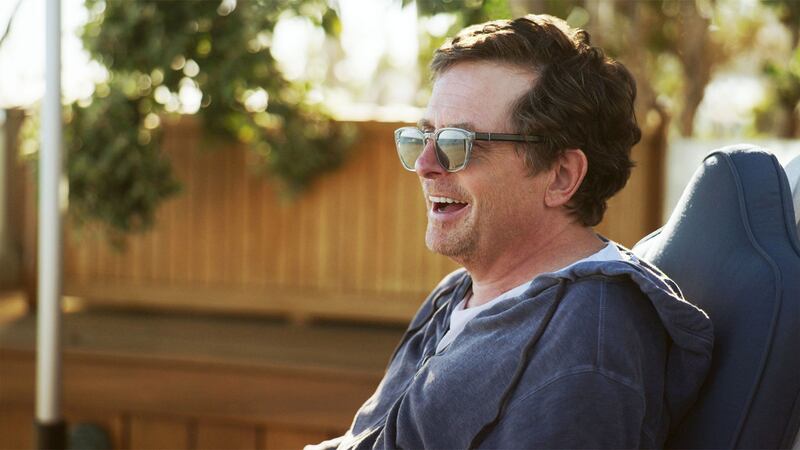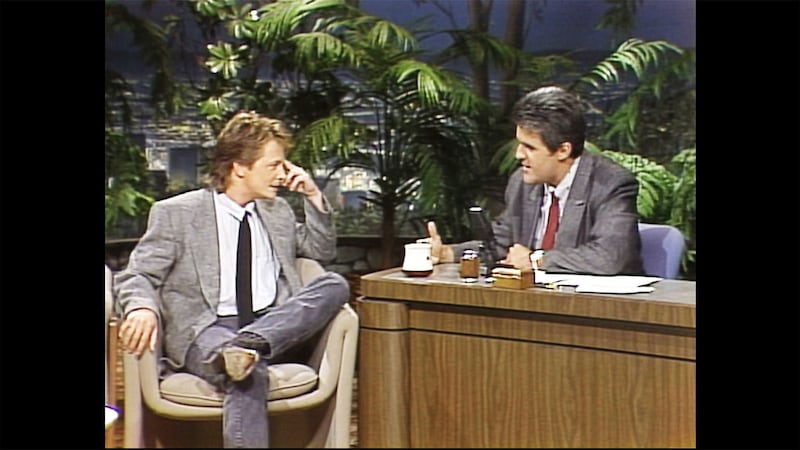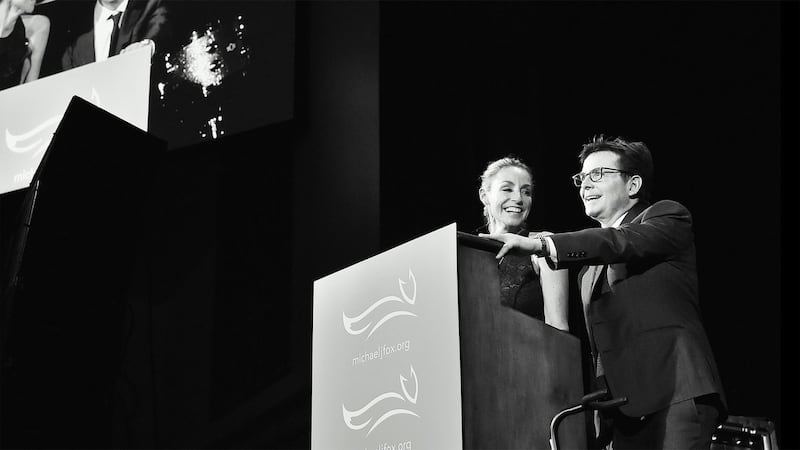In 1998, Michael J. Fox publicly disclosed his Parkinson’s diagnosis for the first time, shocking his millions of fans.
At the time, he was starring on one of the biggest hits on TV, Spin City, which heralded a new, triumphant phase of the career of the beloved and successful star. He was also so young, at just 37. But part of the revelation was that Fox had actually received his diagnosis seven years prior, when he was only 29. Twenty-nine-year-old movie stars aren’t supposed to be battling a progressive disorder so often associated with the elderly. There was a palpable air of public grief that followed the headline-making astonishment.
In the nearly three decades since, Fox has become an activist and an open book, continuing his acting career in between his groundbreaking work lobbying for Parkinson’s research, especially with his Michael J. Fox Foundation.
These are all things that are covered in the new documentary Still: A Michael J. Fox Movie, which premiered earlier this year at the Sundance Film Festival and is now streaming on Apple TV+. But at first, Oscar-winning director Davis Guggenheim (An Inconvenient Truth, Waiting for “Superman,” He Named Me Malala) didn’t think he was the right fit to helm it.

It took time for Guggenheim to convince himself that he was, yet that certainty gave way to new concerns. He wanted to make sure that Still wasn’t going to be the documentary you’d expect about Fox—because Fox’s story isn’t what you’d expect, either. Davis spoke with The Daily Beast’s Obsessed about subverting tropes about celebrities and survivors and the powerful, surprising lessons that Fox can teach us.
The “celebrity documentary” has become its own genre, which has a reputation for sometimes being fluffy or hagiographic. Did you think about Still as a “celebrity documentary,” or did you approach it in a different way?
When I first read his book [Lucky Man: A Memoir], I thought, “This is really good. I wonder who should direct this.” I have this [production] company, so I was like, “Who would be great for this?” I guess my first instinct was that it wasn’t me. Maybe it was my own prejudice about what you just said. Am I prejudiced against celebrity movies? Like, “Oh, It’s gonna be one of those.”
What changed your mind?
As I thought more deeply, [I realized that] there are layers to this story which defies this “celebrity doc,” and defies the “doc about a guy with an illness” too. Those are the two kinds of archetypal stories that the film had to subvert. There are pieces to this story—about him hiding while he had Parkinson’s, him running away, him not doing the right thing—that I thought were super compelling, interesting, and unique. It defies the typical rags-to-riches, “huge celebrity falls from grace” genre. There’s more to it than that, and there’s more to it than the guy who gets a disease and is heroic.
Were you consciously trying to avoid those expectations while making the film?
There was an important breakthrough [we found] when we were cutting the film. I asked Michael, “Everyone’s focused on their narrative right now. Is this the sad-sack story of a guy who gets a debilitating disease and it crushes him?” And Michael thinks for a minute. Then he looks and he goes, “No, that’s boring.”
Oh, I definitely remember that line from the movie.
What’s important is the moment before that, where you see him in his present state. He wakes up. He’s taking his medications. His feet are really tight, in the way Parkinson’s patients’ are. And then you see his hand at the sink, trying to put toothpaste on [his toothbrush]. The idea of that [scene] is that the audience is like, “Oh, it’s gonna be one of those movies.” And then I asked that question, where he said, “It’s boring.” So the idea is to turn it on its head and go, “OK. Look at him differently.”
Did it excite you when he said that? It must have confirmed what you had thought, that this wasn’t a story that aligned with those tropes.
It’s in his writing. His books are so well written. There’s great storytelling about waking up in a hotel in Florida with his finger moving, thinking it’s a moth. There’s great storytelling about him doing Family Ties and Back to the Future at the same time. And obviously, he’s Michael J. Fox, so he’s funny. But there’s a wisdom in what he has to say that I was really drawn to. He has something to say about life. He’s 60. I’m almost 60. That felt really powerful to me, about what it means to be mortal.

Do you think it matters whether the filmmaker of a celebrity documentary like this one is a fan of the subject’s work?
We’re lucky that we had both [a fan and a non-fan]. Michael Hart, the film’s editor, he’s an uber-fan, and he is responsible for all the use of Michael J. Fox's movies as archival footage, in ways that I couldn’t imagine. I was a casual fan. I hadn’t seen all his movies. I was watching different movies in the ’80s. I was watching much more serious movies. So we both had a different approach [to the material]. I think that was helpful. If I was just an uber-fan, the movie would have steered one way too far. And if it was just someone who didn’t know anything about them, you would have lost the fun that I think Michael Hart found in the cutting.
I imagine you had a certain expectation of what Fox might be like from reading his book. Did anything happen that subverted your expectations of him, when you got to know him while making this film?
There’s prejudice we have of people with disabilities. There’s also prejudice we have of people who are funny. The Academy Awards rarely honors funny people. That’s weird. I thought, “Oh, Michael J. Fox, he’s funny. He’s handsome. He’s quick with a joke.” And maybe the next thought was, “Oh, [he’s probably] not particularly deep.” The surprise of Michael, which I feel is part of my prejudice, is that he is incredibly deep.
There’s deep wisdom in his books, and there’s deep wisdom in this movie. He has learned something that few people on the planet have learned about what it means to live with—I’m not even going to call it a disability—a heavy, heavy burden. How he’s chosen to deal with that is very moving to me. And very useful. As a man in the world, a 59-year-old human, he taught me a way to live which I didn’t have before I made this movie.
I remember when Fox publicly disclosed his Parkinson’s diagnosis for the first time. Every news program was talking about it. It was on every magazine cover. Do you remember your reaction to his announcement at the time?
I remember going, “That’s awfully young. Isn’t Parkinson’s an old person’s disease?” But again, I wasn’t the person who watched Spin City every week. There are some people who feel so intensely close to him, because they’ve watched everything. I wasn’t that person. […] I probably said, “That’s sad,” and moved on with my day. Only now do I understand what a big deal that was, and the fact that he had kept that secret for so long, and what it meant to keep that secret.
That he kept that secret really is amazing.
His self-acceptance is stunningly beautiful to me. It’s my favorite part of the movie, because he’s liberated. He’s liberated as an actor. He’s in The Good Wife. Curb Your Enthusiasm is my favorite stuff he’s ever done. And he’s liberated as a person. He’s a movie star. He looks older and has a tough time walking, but he’s accepted himself. That’s stunningly beautiful to me.

I haven’t thought about this until now, but I remember at Sundance, Fox was in the audience for Julia Louis-Dreyfus’ film, You Hurt My Feelings, and he asked a question during the Q&A. It was hard to understand him, and he had trouble holding the microphone, but he still did it. I think that illustrates exactly the point you just made.
Yeah. He’s like, “Fuck it.” Like, “If you can’t understand me, that’s your problem.” The other quote in the movie I like: I said to him, “When people see you walking, they’re like, ‘Oh, fuck.’” He goes, “If you pity me, that’s never gonna get to me. I’m not pathetic. I’ve got shit going on.”
I loved that line.
In the beginning of the movie [when he first says it], it sounds casual and flippant. But that attitude is hard won. It took him years to get to that point. It’s why people are so moved by him.
At its Sundance premiere, there were people who were excited for the film because they wanted to see a tearjerker. What do you make of people who anticipate Still being that kind of documentary?
When I pitched this to Apple, I was like, “I don’t want to make a documentary. I want to make an ’80s movie. Big music, big score that was so typical in an ’80s movie.”
I think people expect something with this movie. I have friends who say, “I’m coming to your movie. I’m bringing my box of tissues with me.” It’s kind of odd, because people often do cry at this movie.

There were definitely people crying when I saw it.
But what I don’t want to do is follow the trope. I don’t think Michael wants to be put in a box. He doesn’t want to be seen as heroic. I think he wants to be seen as Michael J. Fox. He is a guy who just took the thing on and is living his life and wants to be understood.
You mentioned how people sometimes have an “Oh, fuck” reaction to seeing Fox, or other people with Parkinson’s, start shaking. There’s a great scene from The Good Wife that’s used in the film, where Fox’s character is explaining his shaking to a jury and says something along the lines of, “You’ll get used to it.” You spent so much time with him making this. What your experience getting comfortable with his movements and his way of delivering speech?
That’s a great question, and you’re the first person that has mentioned that line. I think that’s what his gift is: He helps you get used to it faster than anybody else. He says, “I’m a cockroach. You can’t kill a cockroach.” And you’ll be like, “OK, fine.”
Another great line.
I think people with disabilities are scary to people. I think it’s confronting to see someone in Michael J. Fox’s condition. He talks about this. What’s really happening is, “Oh, fuck, I hope that’s not me.” You see someone destitute on the street, and you’re like, “God, I hope that’s not me.” “I hope I don’t get Parkinson’s.” “I hope I don’t have to be in a wheelchair.”
We have an unspoken prejudice and an unspoken projection onto ourselves. We brace. We try not to brace. We try to be really kind, good people. It’s a natural response. But I think one of Michael’s gifts is to break through that relationship and say, “I am a dad. My kids make fun of me. I’ve still got a quick joke. I’m flawed. I’ve done some bad shit. I’ve done some good shit. Look at me as a person.” That’s his gift.
Keep obsessing! Sign up for the Daily Beast’s Obsessed newsletter and follow us on Facebook, Twitter, Instagram and TikTok.






